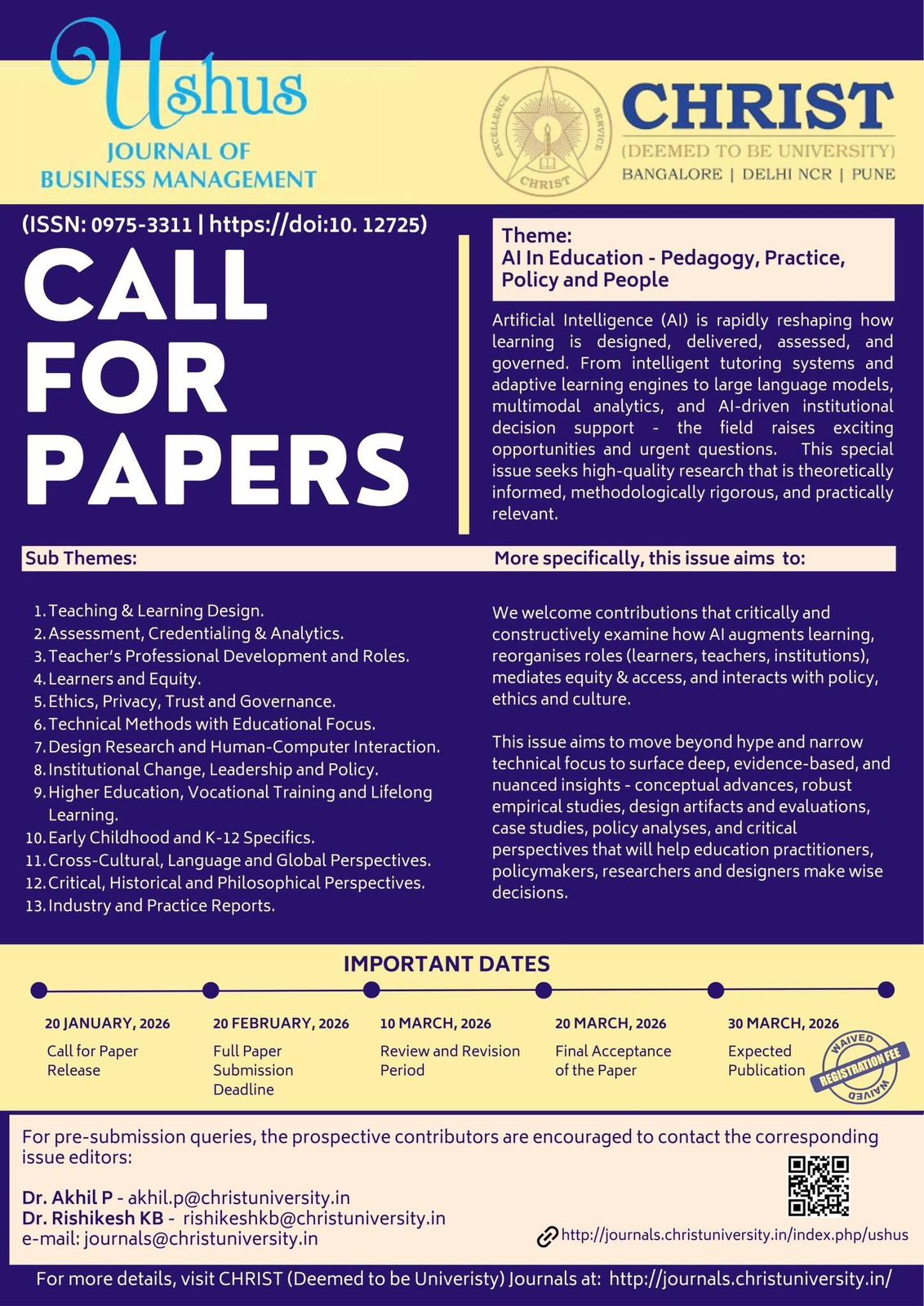Leadership Styles and Emotional Intelligence of Women Entrepreneurs
DOI:
https://doi.org/10.12725/ujbm.59.3Keywords:
Women Entrepreneurs, Emotional Intelligence, Leadership Styles, Entrepreneurs, BusinessAbstract
As women entrepreneurs, women must be aware of their emotions and feelings since Emotional Intelligence(EI) is a key component of effective leadership. Leaders with high emotional intelligence are happier and are more committed to their organization (Abraham, 2000), and they also use positive emotions to visualize the improvements in the organization’s functions (George, 2000). The study focuses on the factors of EI and leadership that influence women entrepreneurs in their entrepreneurial activities, which also impact the success of the business. The quantitative approach will be followed throughout the study to measure the variables. The descriptive study is also employed to identify characteristics of women entrepreneurs who deal with managing leadership and emotional intelligence problems. The TEIQue (Trait Emotional Intelligence Questionaire) was used to measure EI, and Vannsimpco Leadership Survey (VLS) was used to determine the leadership styles. The study was conducted among 132 women entrepreneurs from South India. The findings of the study revealed that there is a significant relationship between EI and leadership. The educational level of entrepreneurs impacts both EI and leadership.
References
Abraham, R. (2000). The role of job control as a moderator of emotional dissonance and emotional intelligence–outcome relationships. The Journal of Psychology, 134(2), 169-184. George, J. M. (2000). Emotions and leadership: The role of emotional intelligence. Human Relations, 53(8), 1027-1055. Verma, Aarti., & Mulani, Mahesh., (2018). Challenges and Issues of Working Woman in 21st Century. International Journal of Research in All Subjects in Multi Languages, 6(3). Winn, J. (2005). Women entrepreneurs: Can we remove the barriers? The International Entrepreneurship and Management Journal, 1(3), 381-397. Ambepitiya, K. R. (2016). The role of women entrepreneurs in establishing sustainable development in developing nations. World Review of Business Research, 6(1), 161-178.
Farhat, J., & Mijid, N. (2018). Do women lag behind men? A matched-sample analysis of the dynamics of gender gaps. Journal of Economics and Finance, 42(4), 682-709. Goleman, D. (1998). Working With Emotional Intelligence. London: Bloomsbury. Oginska-Bulik, N. (2005). Emotional intelligence in the workplace: Exploring its effects on occupational stress and health outcomes in human service workers. International Journal of Occupational Medicine and Environmental Health, 18(2), 167-175. Ngah, R., & Salleh, Z. (2015). Emotional intelligence and entrepreneurs’ innovativeness towards entrepreneurial success: A preliminary study. American Journal of Economics, 5(2), 285-290. LaRae Quy. (2016, November 2). Using emotional intelligence is a woman leader’s secret weapon. Forbes. https://www.forbes.com/sites/womensmedia/2016/11/02/using-emotional-intelligence-is-a-woman-leaders-secret-weapon/?sh=79bbdee119f7 Downey, L. A., Papageorgiou, V., & Stough, C. (2006). Examining the relationship between leadership, emotional intelligence and intuition in senior female managers. Leadership & Organization Development Journal. Cavallo, K., & Brienza, D. (2002). Emotional competence and leadership excellence at Johnson & Johnson: The emotional intelligence and leadership study. Consortium for Research on Emotional Intelligence in Organizations, 1-12. Neqabi, S., & Bahadori, M. (2012). Relationship between emotional intelligence and entrepreneurial behavior. Journal Mil Med, 14(2), 123-128. Miao, C., Humphrey, R. H., & Qian, S. (2016). Leader emotional intelligence and subordinate job satisfaction: A meta-analysis of main, mediator, and moderator effects. Personality and Individual Differences, 102, 13-24.
Beck Megan & Libert Barry (2017). Career Transitions: The rise of ai makes emotional intelligence more important. HBR.ORG. https://hbr.org/2017/02/the-rise-of-ai-makes-emotional-intelligence-more-important Humphrey, R. H. (2002). The many faces of emotional leadership. The Leadership Quarterly, 13(5), 493-504. Khan, A. Z., & Adnan, N. (2014). Impact of leadership styles on organizational performance. International Journal of Management Sciences, 2(11), 501-515. Agarwal, S., & Lenka, U. (2015). Study on work-life balance of women entrepreneurs–review and research agenda. Industrial and Commercial Training. Abbas, T., Abrar, M., Saleem, R., & Iqbal, A. (2016). What Leads To Success for Women Entrepreneurs? An Empirical Study of Southern Punjab in Pakistan. Academic Research International, 7(5), 120-130. Alam, S. S., Jani, M. F. M., & Omar, N. A. (2011). An empirical study of success factors of women entrepreneurs in southern region in Malaysia. International Journal of economics and Finance, 3(2), 166-175. Buttner, E. H., & Moore, D. P. (1997). Women's organizational exodus to entrepreneurship: Self-reported motivations and correlates with success. Journal of small business management, 35, 34-46. Ehigie, B. O., & Umoren, U. E. (2003). Psychological factors influencing perceived entrepreneurial success among Nigerian women in small-scale businesses. Journal of International Women's Studies, 5(1), 78-95. Mohanty, A., Pradhan, R. K., & Jena, L. K. (2015). Curiosity and meaning of life leading towards personal growth: The role of emotional intelligence. Journal of the Indian Academy of Applied Psychology, 41(2), 1-35.Yitshaki, R. (2012). How do entrepreneurs’ emotional intelligence and transformational leadership orientation impact new ventures’ growth? Journal of Small Business & Entrepreneurship, 25(3), 357-374.
Brackett, M. A., Mayer, J. D., & Warner, R. M. (2004). Emotional intelligence and its relation to everyday behaviour. Personality and Individual differences, 36(6), 1387-1402. Maqbool, R., Sudong, Y., Manzoor, N., & Rashid, Y. (2017). The impact of emotional intelligence, project managers’ competencies, and transformational leadership on project success: An empirical perspective. Project Management Journal, 48(3), 58-75. Allameh, S. M., Pool, J. K., Kazemi, R. V., & Mostafavi, M. (2015). The impact of emotional intelligence on transformational leadership and leader effectiveness. Latin American Journal of Management for Sustainable Development, 2(1), 83-93. Bahadori, M. (2012). The effect of emotional intelligence on entrepreneurial behavior: A case study in a medical science university. Asian Journal of Business Management, 4(1), 81-85. Rahman, M. S., Ferdausy, S., & Uddin, M. A. (2012). Exploring the relationships between emotional intelligence, leadership styles, and gender: An empirical study. SIU Journal of Management, 2(2), 27-57. Eagly, A. H., & Johnson, B. T. (1990). Gender and leadership style: A meta-analysis. Psychological bulletin, 108(2), 233. Carli, L. L., & Eagly, A. H. (2001). Gender, hierarchy, and leadership: An introduction. Journal of Social issues, 57(4), 629-636. Ashforth, B. E., & Humphrey, R. H. (1995). Emotion in the workplace: A reappraisal. Human relations, 48(2), 97-125. Al Khajeh, E. H. (2018). Impact of leadership styles on organizational performance. Journal of Human Resources Management Research, 2018, 1-10. Khan, A. Z., & Adnan, N. (2014). Impact of leadership styles on organizational performance. International Journal of Management Sciences, 2(11), 501-515.
Mandell, B., & Pherwani, S. (2003). Relationship between emotional intelligence and transformational leadership style: A gender comparison. Journal of business and psychology, 17(3), 387-404. Barling, J., Slater, F., & Kelloway, E. K. (2000). Transformational leadership and emotional intelligence: An exploratory study. Leadership & Organization Development Journal. Ling, W., Chia, R. C., & Fang, L. (2000). Chinese implicit leadership theory. The Journal of Social Psychology, 140(6), 729-739. Lowe, K. B., Kroeck, K. G., & Sivasubramaniam, N. (1996). Effectiveness correlates of transformational and transactional leadership: A meta-analytic review of the MLQ literature. The leadership quarterly, 7(3), 385-425.
Downloads
Published
How to Cite
Issue
Section
License
Copyright (c) 2022 Nivetha V

This work is licensed under a Creative Commons Attribution-NonCommercial-NoDerivatives 4.0 International License.



